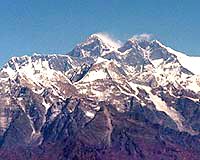| . |  |
. |
Paris (AFP) Dec 1, 2009 Quickening ice loss in West Antarctica will likely contribute heavily to a projected sea level rise of up to 1.4 metres (4.5 feet) by 2100, according to a major scientific report released Tuesday. Scientists long held that most of Antarctica's continent-sized ice sheet was highly resistant to global warming, and that the more vulnerable West Antarctic ice block would remain intact for thousands of years to come. The Intergovernmental Panel on Climate Change (IPCC) -- whose 2007 report is the scientific benchmark for the UN December 7-18 Copenhagen climate summit -- did not even factor melting ice sheets into its forecasts for rising seas. But studies since then show huge loss of ice mass, mainly as a result of warmer ocean temperatures, according to the review by more than 100 experts on the Scientific Committee on Antarctic Research. The new evidence suggests that West Antarctica in particular will add "tens of centimetres" to the global ocean watermark, which is predicted to go up two to nine times higher than the IPCC forecast, according to the report. Even the relatively modest IPCC projection of a 18-59 centimetre (7-23 inch) increase by 2100 would render several island nations unlivable and wreak havoc in low-lying deltas home to hundreds of millions. Ironically, the impact of global warming on the region is set to intensify over the next century due to the successful effort to repair another kind of damage to the environment -- depletion of the ozone layer. A hole in the ozone layer caused by the release of CFC (chlorofluorocarbon) gases has cooled temperatures and shielded most of Antarctica from global warming, the report found. "The most astonishing evidence is the way that one man-made environmental impact -- the ozone hole -- has shielded most of Antarctica from another, global warming," said John Turner, head of climate research for the British Antarctic Survey and lead editor or the review. The stable temperatures -- and in some areas additional cooling -- over much of the vast Antarctic continent during the last 30 years has been offered as evidence by climate skeptics that global warming trends were exaggerated or simply false. But with measures to control the CFC gases, the scientists said they expected the hole to "heal" in around 50 to 60 years, leading to additional warming of about 3.0 Celsius (5.4 Fahrenheit) by century's end. Already today, 90 percent of the Antarctic Peninsula's glaciers have retreated in the last few decades, though the bulk of the continent's ice sheet has so far shown little change. The 550-page report highlights several other recent findings: -- Earth's most powerful ocean current, the Antarctic Circumpolar Current, has warmed faster than the global ocean as a whole. This is set to disrupt the region's ecosystems, including the rise of alien species that compete with and replace native Antarctic inhabitants. That process has already begun on the Antarctic Peninsula, where rapid warming has resulted in the expansion of plant, animal and microbial communities -- many of them introduced by humans -- on newly thawed land. -- Sea ice loss and ocean acidification are directly affecting wildlife, and could reduce Antarctica's rich biodiversity, from the bottom to the top of the food chain. Tiny krill have declined significantly, and in some areas Adelie penguin populations have dropped due to reduced sea ice and prey. In other regions, however, notably Ross Sea and East Antarctica, populations of the flightless birds have remained stable or gone up. -- Levels of carbon dioxide and methane, the two main greenhouse gases, are higher and increasing faster than at any time in the last 800,000 years. At the same time, recent studies show that small changes in climate over the last 11,000 years -- the last ice age -- has caused rapid ice loss along with shifts in ocean and atmospheric circulation.
Share This Article With Planet Earth
Related Links Beyond the Ice Age
 Nepal government to hold Everest climate meeting
Nepal government to hold Everest climate meetingKathmandu (AFP) Nov 28, 2009 Nepal's cabinet will meet in the shadow of Mount Everest next week to highlight the impact of global warming on the Himalayas ahead of UN climate talks in Copenhagen, officials said Saturday. Twenty-six ministers, together with staff, will travel to the town of Gorakshep, high up in the foothills of Everest, for the special climate-themed meeting, said Bishnu Rijal, press advisor to Prime ... read more |
|
| The content herein, unless otherwise known to be public domain, are Copyright 1995-2009 - SpaceDaily. AFP and UPI Wire Stories are copyright Agence France-Presse and United Press International. ESA Portal Reports are copyright European Space Agency. All NASA sourced material is public domain. Additional copyrights may apply in whole or part to other bona fide parties. Advertising does not imply endorsement,agreement or approval of any opinions, statements or information provided by SpaceDaily on any Web page published or hosted by SpaceDaily. Privacy Statement |